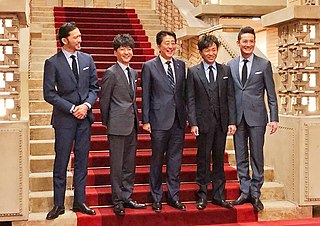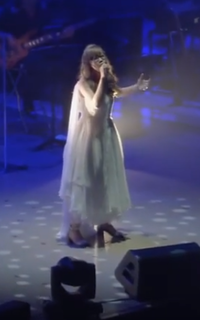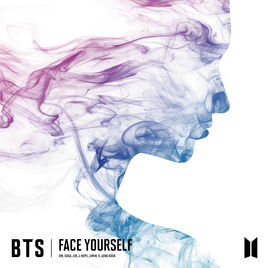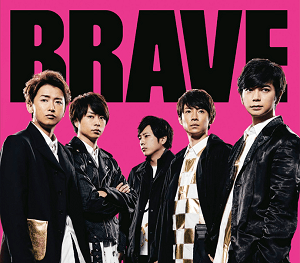Related Research Articles
Dragon Ash is a Japanese rap rock group founded in 1996 by Kenji "KJ" Furuya and Sakurai Makoto. They were one of the first groups to popularize hip hop in Japan. Dragon Ash is a member of Mob Squad, which is an affiliation with the bands Source and Endive. Dragon Ash uses the French fleur-de-lis as their band logo/symbol.

Tokio is a Japanese rock/pop band formed by Johnny & Associates that debuted in 1994. It is made up of four men who were signed with Sony Music Entertainment from 1994 to 2001, with Universal Music Japan from 2001 to 2008, and are now signed under J Storm, a label owned by Johnny & Associates. In addition to their activities as a band, the members of Tokio also act in dozens of dramas and host variety programmes, both as a group and individually.

Supercell is an 11-member Japanese pop band led by musician and songwriter Ryo, which formed in 2007 as a dōjin music band. The other 10 members are artists and designers who provide illustrations in album booklets and music videos. Supercell started out by making use of the Hatsune Miku Vocaloid singing synthesizer to produce vocals for songs submitted to the Nico Nico Douga video sharing website. The popularity of the songs led the band to release their independent self-titled album Supercell (2008). Supercell later signed to Sony Music Entertainment Japan and had a professional release of their Supercell album in March 2009, which was updated with more songs.
"Taiyō to Sabaku no Bara"/"Subeki Koto" is the forty-first single by the Japanese band Tokio. It was the first single released by Tokio in eleven months, having been released on August 19, 2009. The single reached third place on the Oricon charts and charted for three weeks. The song "Taiyō to Sabaku no Bara" is used as the theme song to the drama show Karei Naru Spy. The song "Subeki Koto" is currently being used as the ending theme song to 5LDK, a talk show hosted by Tokio.

Aimer is a Japanese pop singer and lyricist signed to SACRA MUSIC and managed by agehasprings. Her name comes from the verb "Aimer" in French, which means "to love". Aimer uses the name Aimerrhythm for lyrics credits.

Eir Aoi is a Japanese singer from Sapporo, Hokkaido, signed to Sacra Music. After being discovered through the Japanese video sharing website Niconico, Aoi made her major debut in 2011 with the release of her first single "Memoria", whose title track was used as the first ending theme to the 2011 anime television series Fate/Zero.

The discography of the Japanese female idol group Momoiro Clover Z consists of 5 full-length studio albums and over 20 singles.
"Time Machine Nante Iranai" is the third solo single by former AKB48 headliner Atsuko Maeda; it was released in Japan on September 18, 2013. It is the first single she has released since she formally left AKB48. She first performed the song at an AKB48 concert in Sapporo Dome where she made a special guest appearance.

"Amagasa" is a song by Japanese band Tokio. It was one of the two A-sides that composed the band's 39th single, along with the song "Akireru Kurai Bokura wa Negaō". The single was released on September 3, 2008, and was their first release with J Storm. "Amagasa" was written by Japanese rock musician Ringo Sheena. In 2014, Sheena covered the two songs she wrote for the single, "Amagasa" and "Kachū no Otoko", for her album Gyakuyunyū: Kōwankyoku.
Happiness is a Japanese pop girl group formed and managed by LDH since 2008 and signed to the record label Rhythm Zone. They are a dance and vocal unit of collective girl group E-girls alongside Dream and Flower. The group consists of two vocalists and three performers.

"Taiyō Knock" is the 12th single by Japanese idol girl group Nogizaka46. It was released on July 22, 2015. It was number-one on the weekly Oricon Singles Chart, reaching a new record for first week sales by the group, with 609,202 copies. It was the best-selling single in Japan in July, with 629,996 copies. As of November 23, 2015 it had sold 678,481 copies. It was also number-one on the Billboard Japan Hot 100. The Japanese television drama series Hatsumori Bemars uses the title song as the theme song.
Myth & Roid is a Japanese pop rock band centered around Tom-H@ck and hotaru, featuring multiple vocalists. The band made its debut in 2015 with the release of its first single "L.L.L". The band's music has been featured in various anime series such as Overlord, Boogiepop wa Warawanai (2019), BBK/BRNK, Saga of Tanya the Evil, Cautious Hero: The Hero Is Overpowered but Overly Cautious, Made in Abyss, Isekai Cheat Magician and Re:Zero − Starting Life in Another World.
"Anata" is a song by Japanese-American singer-songwriter Hikaru Utada. It is their third single under the label Epic Records Japan, from their seventh Japanese-language studio album Hatsukoi. The song was used as a tie-in for movie Destiny: The Tale of Kamakura, and was released as a digital download on December 8. The song is their first movie tie-in in 5 years, since "Sakura Nagashi" was released in 2012 for Evangelion: 3.0 You Can (Not) Redo. The song was written with a Buddhist's view to show both the real and fantasy mixed world shown in the movie. Besides the movie, the song is also featured in a Sony campaign to promote a wireless headphone line, in which they themself also appears.

Face Yourself is the third Japanese studio album by South Korean boy band BTS released on April 4, 2018, through Universal Music Japan and Def Jam Recordings. The album contains Japanese versions of songs previously released on the group's second Korean studio album Wings (2016), and the Love Yourself: Her (2017) extended play (EP), as well as three new, original Japanese-language tracks: "Don't Leave Me", "Let Go", and "Crystal Snow". Its debut at number 43 on the Billboard 200 made it the third-highest-charting Japanese album in the history of the chart.
Reona is a Japanese singer who is signed to Sacra Music. Having been active as a cosplayer and independent musician, she made her major debut in 2018 as the singing voice of the character Elza Kanzaki in the anime series Sword Art Online Alternative: Gun Gale Online. Her first single under her own name was released in August 2018.

"Red Swan" is a song by Japanese musician Yoshiki, featuring vocals by Hyde. Written and produced by Yoshiki, it is the opening theme song of the first 12 episodes of the third season of the Attack on Titan anime series. The television edit of the song was published on digital platforms on July 23, 2018, while the full single version was released on October 3, 2018.

"Brave" is a song by Japanese boy band Arashi, released as a single through J Storm on September 11, 2019. It serves as the theme song for Nippon TV's coverage of the 2019 Rugby World Cup. It is the band's first release to be available in an edition including a Blu-ray.

"Hot Hot Hot / Mirrors" is the 47th Japanese single by South Korean pop duo Tohoshinki, released on July 31, 2019 by Avex Trax as a single for Tohoshinki's tenth studio album XV (2019). It is a double A-sided single featuring "Hot Hot Hot", a summer-themed pop song; and "Mirrors," a theme song for the 2019 Japanese television drama Sign.
Japanese boy group JO1 has released one studio album, five singles, sixteen promotional singles and nine music videos with Lapone Entertainment. As of December 2021, JO1 has sold over 2 million physical copies in Japan according to the Oricon Charts.

"Yūsha Tachi" is a song by Japanese singer-songwriter Miliyah Kato from her second compilation album M Best (2011) and her sixth studio album True Lovers (2012). The song was written by Kato herself, while the production was done by Kato's frequent collaborator, Yuichiro Goto. The single was released for the two versions of CD and digital download on 16 March 2011 through Mastersix Foundation as the lead single from M Best. Ahead of its official release, the short version of the song was released on 2 March 2011 as a ringtone.
References
- General
- "TOKIO Discography On Johnnys-net.jp" . Retrieved 20 September 2015.
- "TOKIO discography on Oricon.co.jp" (in Japanese). Retrieved 2009-11-29.
- Specific
- 1 2 3 4 5 TOKIOのアルバム作品. Oricon . Retrieved 2018-04-09.
- ↑ "Oricon Weekly Album Ranking: Harvest". Oricon. 2006-10-30. Retrieved 2018-04-09.
- ↑ "Oricon Weekly Album Ranking: Sugar". Oricon. 2008-03-03. Retrieved 2018-04-09.
- ↑ "Oricon Weekly Album Ranking: 17". Oricon. 2012-09-03. Retrieved 2018-04-09.
- ↑ "Oricon Weekly Album Ranking: Heart". Oricon. 2014-07-28. Retrieved 2018-04-09.
- 1 2 3 4 5 6 7 8 9 10 11 12 13 14 15 16 17 18 19 20 21 22 23 24 25 26 27 一般社団法人 日本レコード協会 (in Japanese). RIAJ . Retrieved 2018-04-09.
- ↑ TOKIOのシングル作品. Oricon . Retrieved 2018-04-10.
- ↑ "Oricon Weekly Single Ranking: Ashita o Mezashite!". Oricon. 2005-12-19. Retrieved 2018-04-10.
- ↑ "Oricon Weekly Single Ranking: Mr. Traveling Man". Oricon. 2006-02-20. Retrieved 2018-04-10.
- ↑ "Oricon Weekly Single Ranking: Get Your Dream". Oricon. 2006-07-03. Retrieved 2018-04-10.
- ↑ "Oricon Weekly Single Ranking: Sorafune / Do! Do! Do!". Oricon. 2006-09-04. Retrieved 2018-04-10.
- ↑ "Oricon Weekly Single Ranking: Hikari no Machi/Run Free (Swan Dance o Kimi to)". Oricon. 2007-04-09. Retrieved 2018-04-10.
- ↑ "Oricon Weekly Single Ranking: Honjitsu, Mijukumono/Over Drive". Oricon. 2007-08-27. Retrieved 2018-04-10.
- ↑ "Oricon Weekly Single Ranking: Seisyun". Oricon. 2007-12-10. Retrieved 2018-04-10.
- ↑ "Oricon Weekly Single Ranking: Amagasa/Akireru Kurai Bokura wa Negaō". Oricon. 2008-09-15. Retrieved 2018-04-10.
- ↑ "Oricon Weekly Single Ranking: Taiyō to Sabaku no Bara/Subeki Koto". Oricon. 2009-08-31. Retrieved 2018-04-10.
- ↑ "Oricon Weekly Single Ranking: Advance/Mata Asa ga Kuru". Oricon. 2010-02-15. Retrieved 2018-04-10.
- ↑ "Oricon Weekly Single Ranking: Haruka". Oricon. 2010-06-28. Retrieved 2018-04-10.
- ↑ "Oricon Weekly Single Ranking: NaNaNa (Taiyo Nante Irane)". Oricon. 2010-08-23. Retrieved 2018-04-10.
- ↑ "Oricon Weekly Single Ranking: Miageta Ryūsei". Oricon. 2011-06-06. Retrieved 2018-04-10.
- ↑ "Oricon Weekly Single Ranking: Haneda Kūkō no Kiseki/Kibou". Oricon. 2012-03-12. Retrieved 2018-04-10.
- ↑ "Oricon Weekly Single Ranking: Lyric". Oricon. 2013-03-04. Retrieved 2018-04-10.
- ↑ "Oricon Weekly Single Ranking: Tegami". Oricon. 2013-04-01. Retrieved 2018-04-10.
- ↑ "Oricon Weekly Single Ranking: Hontontoko/Future". Oricon. 2013-11-11. Retrieved 2018-04-10.
- ↑ "Oricon Weekly Single Ranking: Love, Holiday". Oricon. 2014-06-02. Retrieved 2018-04-10.
- ↑ "Oricon Weekly Single Ranking: Tokyo Drive". Oricon. 2015-11-09. Retrieved 2018-04-10.
- ↑ "Oricon Weekly Single Ranking: Fragile". Oricon. 2016-03-07. Retrieved 2018-04-10.
- ↑ "Oricon Weekly Single Ranking: Ai! Wanna Be With You..." Oricon. 2016-12-12. Retrieved 2018-04-10.
- ↑ "Oricon Weekly Single Ranking: Kumo". Oricon. 2017-09-11. Retrieved 2018-04-10.
- ↑ "Billboard Japan Hot 100". Billboard Japan . Retrieved 2018-04-10.
- ↑ "Billboard Japan Hot 100: Amagasa/Akireru Kurai Bokura wa Negaō". Billboard Japan. 2008-09-15. Retrieved 2018-04-10.
- ↑ "Billboard Japan Hot 100: Taiyō to Sabaku no Bara/Subeki Koto". Billboard Japan. 2009-08-31. Retrieved 2018-04-10.
- ↑ "Billboard Japan Hot 100: Advance/Mata Asa ga Kuru". Billboard Japan. 2010-02-15. Retrieved 2018-04-10.
- ↑ "Billboard Japan Hot 100: Haruka". Billboard Japan. 2010-06-28. Retrieved 2018-04-10.
- ↑ "Billboard Japan Hot 100: NaNaNa (Taiyo Nante Irane)". Billboard Japan. 2010-08-23. Retrieved 2018-04-10.
- ↑ "Billboard Japan Hot 100: Miageta Ryūsei". Billboard Japan. 2011-06-06. Retrieved 2018-04-10.
- ↑ "Billboard Japan Hot 100: Haneda Kūkō no Kiseki/Kibou". Billboard Japan. 2012-03-12. Retrieved 2018-04-10.
- ↑ "Billboard Japan Hot 100: Lyric". Billboard Japan. 2013-03-04. Retrieved 2018-04-10.
- ↑ "Billboard Japan Hot 100: Tegami". Billboard Japan. 2013-04-01. Retrieved 2018-04-10.
- ↑ "Billboard Japan Hot 100: Hontontoko/Future". Billboard Japan. 2013-11-11. Retrieved 2018-04-10.
- ↑ "Billboard Japan Hot 100: Love, Holiday". Billboard Japan. 2014-06-02. Retrieved 2018-04-10.
- ↑ "Billboard Japan Hot 100: Tokyo Drive". Billboard Japan. 2015-11-09. Retrieved 2018-04-10.
- ↑ "Billboard Japan Hot 100: Fragile". Billboard Japan. 2016-03-07. Retrieved 2018-04-10.
- ↑ "Billboard Japan Hot 100: Ai! Wanna Be With You..." Billboard Japan. 2016-12-12. Retrieved 2018-04-10.
- ↑ "Billboard Japan Hot 100: Kumo". Billboard Japan. 2017-09-11. Retrieved 2018-04-10.
- ↑ "一般社団法人 日本レコード協会" (in Japanese). RIAJ . Retrieved 2018-04-10.
- ↑ TOKIO、TUBE提供曲で2年7ヶ月ぶり首位 (in Japanese). Oricon. 2010-06-22. Retrieved 2010-06-21.